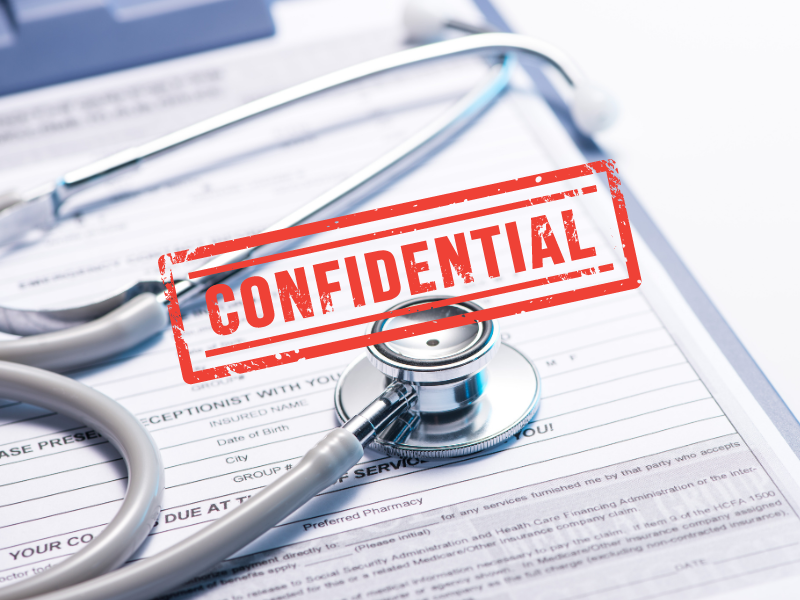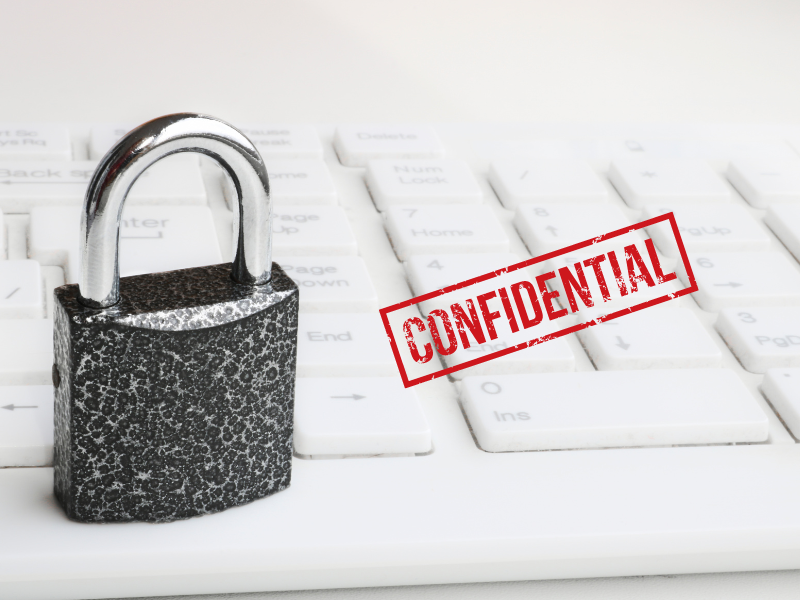Given the emerging threats to patient privacy, healthcare providers and organizations must take safeguarding confidential medical records seriously. After all, these records contain sensitive patient information that malicious people can exploit for their own gains.
Take mailing confidential medical records, for example. The absence of proper security measures during storage and transit can lead to serious data breaches and unauthorized disclosure of sensitive health information.
Table of Contents

Mailing Confidential Medical Records and HIPAA Compliance
The Health Insurance Portability and Accountability Act (HIPAA) aims to safeguard the privacy and security of protected health information (PHI). It sets strict guidelines that covered entities and their business associates must follow. This includes implementing the necessary security measures to keep PHI safe during transit.
To comply with HIPAA regulations, healthcare organizations must implement safe mailing practices. When mailing confidential records, taking preventive measures such as using tamper-evident envelopes can significantly mitigate the risk of unauthorized access. Doing so helps ensure that the mailed information remains confidential.
Potential Risks in Mailing Confidential Medical Records
By understanding these risks and implementing security precautions, healthcare providers can ensure the confidentiality and privacy of sensitive medical records throughout the mailing process.
Unauthorized access
Medical records sent through the mail are highly susceptible to unauthorized access. Malicious people could intercept the mail and steal sensitive information such as social security numbers, credit card numbers, and medical billing information. Such illicit acts could lead to devastating consequences, such as identity theft, loss of trust, and damaged reputation.
Loss or damage
Records can get misplaced or lost in the mail. This could compromise patient care and cause delays in healthcare services and treatment. There’s also the risk of physical damage due to mishandling and accidents during transportation. These unfortunate incidents can render confidential medical records unreadable or unusable.
Data breaches
Medical records sent through electronic mail, or email, are prone to hacking. As such, hackers can effortlessly access sensitive health information without adequate security measures like robust encryption. The consequences of these breaches can be severe, often leading to legal sanctions and costly settlements.

Can You Mail Medical Records to a Patient?
According to the regulations set by HIPAA on mailing medical records, healthcare providers and institutions must send PHI-related documents through First Class postal mail. However, in some cases, a recipient’s signature will be required. There should also be a way to track and certify the mail to ensure its successful delivery.
On top of this, there are legal requirements that healthcare organizations must provide when mailing confidential medical records to ensure HIPAA compliance.
This includes the following:
Patient authorization
Before mailing medical records, always remember to obtain consent from the patient or their legal representative. You must adequately inform and explain to your patients why you’re sending their medical information through the mail and the associated risks that come with it. Keeping an audit trail of the mailed records is also crucial to ensure compliance with federal and state privacy laws.
Record retention and disposal
Healthcare providers must follow specific guidelines for how long they should they retain the records before proper disposal. Secure disposal methods, such as shredding or secure electronic erasure, should be used to prevent unauthorized access.
Security and compliance measures
Under HIPAA, healthcare providers and organizations must implement measures to prevent unauthorized access or loss of medical records during mailing. Compliance with HIPAA requirements helps keep PHI safe and, at the same time, steer your organization clear of potential violations leading to costly penalties.
State Laws Governing Mailing Medical Records
In the United States, mailing confidential medical records must adhere to state laws, including:
- California Confidentiality of Medical Information Act (CMIA): Healthcare providers in California must comply with the requirements of this state law involving the disclosure and protection of sensitive medical information.
- New York State Law: This law requires confidential records, medical-related or not, to be mailed through secure means and should be sealed in an envelope with a “Confidential” label or marking.
- Florida Information Protection Act (FIPA): Healthcare providers in Florida must mail documents containing personally identifiable information (PII) using a reputable mail service that provides tracking and signature for confirmation.
- Texas Medical Records Privacy Act (TMRPA): Businesses and organizations in this state must ensure the safety of confidential records while in transit by enclosing them in a sealed package or envelope marked as “Confidential.”
Best Practices for Mailing Confidential Medical Records
By following these strategies, healthcare providers can enhance the security and confidentiality of mailed medical records.
Secure packaging and handling
When mailing confidential medical records, it is crucial to use secure packaging specifically designed for sensitive information. Using tamper-proof envelopes helps ensure the confidentiality and integrity of the medical records, reducing the risk of unauthorized access or disclosure.
Verifying recipient information
Before sending the medical records, always double-check the recipient’s information. This process involves verifying the email address or contact information based on the contact details provided. Doing so helps ensure the proper delivery of the mailed records and that they don’t fall into the wrong hands.
Implementing encryption and password protection
When transmitting medical records electronically through email or cloud-based platforms, it is essential to use encryption and password protection. Encryption converts the data into an unreadable format, ensuring it remains inaccessible to unauthorized individuals. Only authorized recipients with the correct encryption key and password can have access.

Alternatives to Mailing Medical Records
Knowing how to send confidential medical records securely and without depending on standard physical mail can help minimize potential risks and avoid delays.
The next time you need to send a medical record, consider opting for the following:
File-sharing services
Healthcare providers can securely upload medical records to the file transfer service. Then, the recipient receives a notification with a secure link to download the documents. This method ensures the secure transmission of sensitive files to the intended recipient. At the same time, it helps reduce the risks associated with physical mail or traditional email.
Encrypted email services
Emails are vulnerable to hacking incidents, but encrypted email services make it difficult for malicious users to intercept your sensitive files. Unlike typical email providers, these services offer robust security measures like end-to-end encryption to ensure your confidential records remain confidential.
Password-protected documents
Using passwords to protect your confidential records serves as an effective first line of defense against unauthorized access. Even if the file gets intercepted, there’s a password that will prevent anyone from viewing or modifying the contents inside it. However, it’s crucial to use a strong password that’s difficult to guess or crack.
Virtual Private Networks (VPNs)
Per HIPAA regulations, VPNs can help ensure data privacy by establishing encrypted connections. This way, the transmitted data goes through secure tunnels with concealed IP addresses, making it difficult for unauthorized users to access sensitive medical information without consent.
Medical courier services
Choosing a reputable mail service is one thing, but when it comes to mailing confidential health records, it’s always best to seek those who specialize in transporting sensitive medical records. These service providers typically fall under the HIPAA conduit exception rule as long as they meet the strict regulatory requirements.
Online fax services
Faxing online can help you transmit patient records without depending on traditional fax machines. Also, you can conveniently grant access to authorized individuals through a secure network. HIPAA-compliant fax services like iFax help you stay compliant while safely faxing medical records directly from your EHR or EMR system. Moreover, it offers military-grade security capable of high-volume faxing, complete with audit logs and real-time monitoring.
Ensure the Privacy and Confidentiality of Patient-Related Data
Mailing confidential medical records poses risks, but there are proven and efficient ways to mitigate the chances of data breaches and damaged documents. As long as you comply with the regulations set by HIPAA and follow safe mailing practices, you can avoid the common security pitfalls and handle sensitive records containing PHI with ease and confidence.







